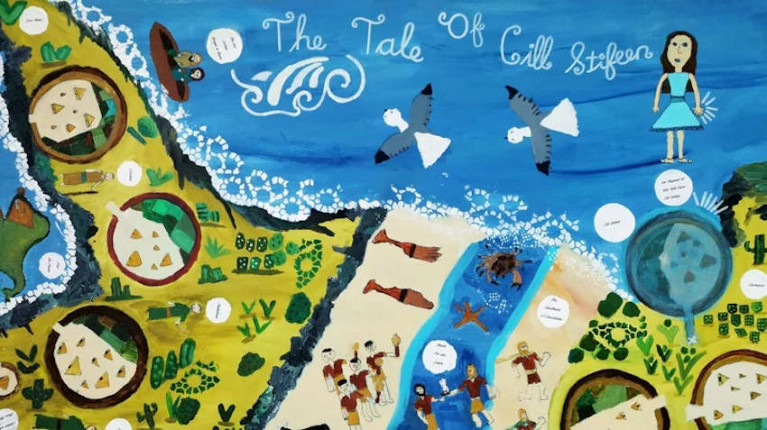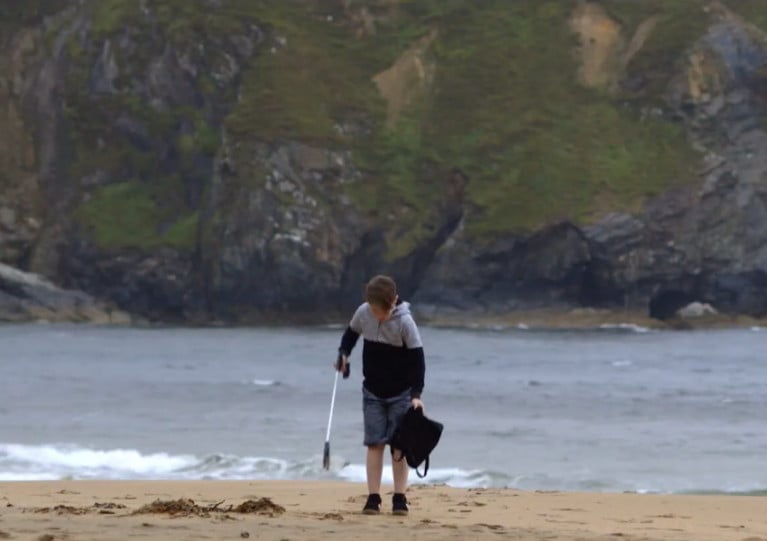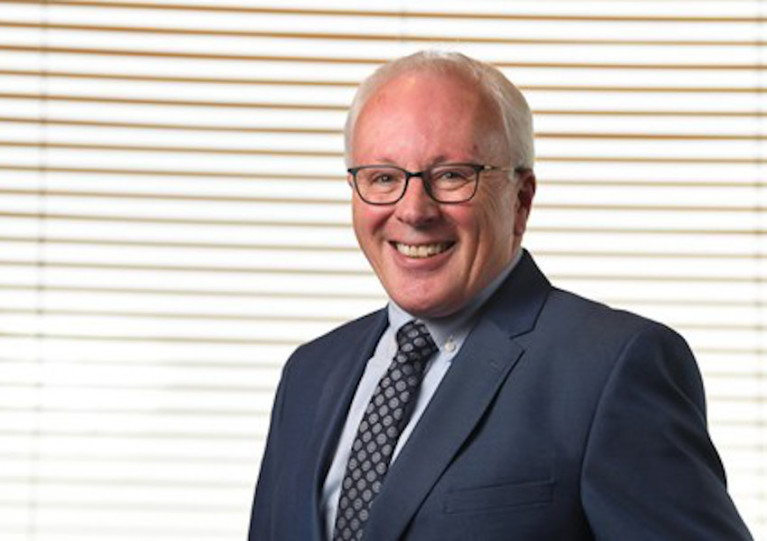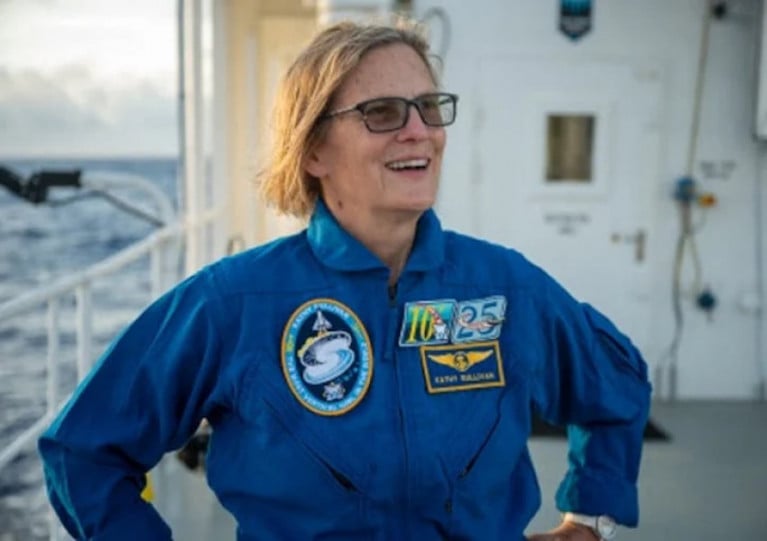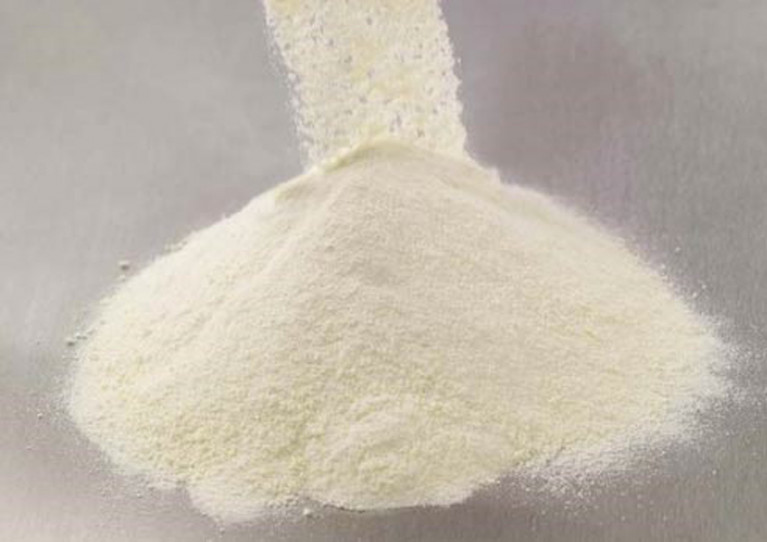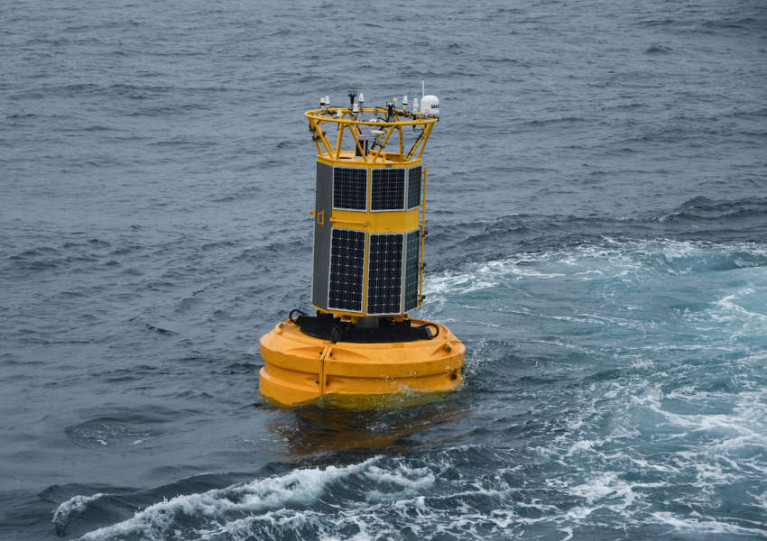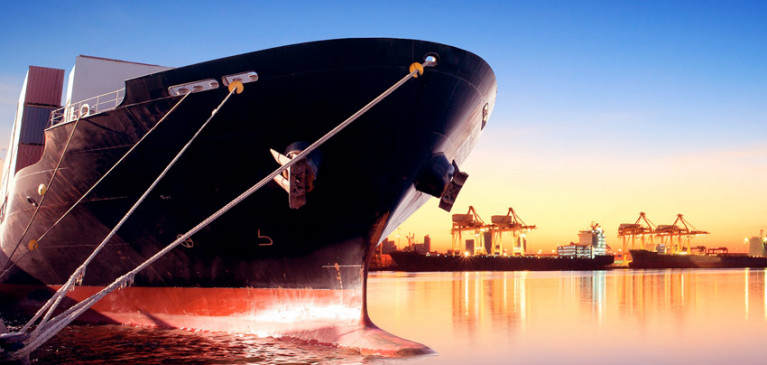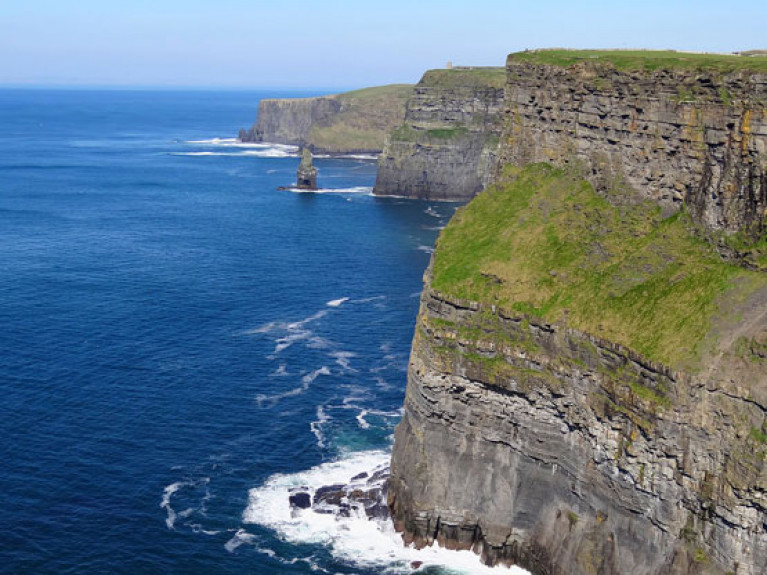Displaying items by tag: Oceans of Learning
‘Oceans Of Learning’ Now Featured By RTÉ Learn Online
RTÉ’s Learn web hub this week features content from the Marine Institute’s Oceans of Learning series.
The selection of videos, interactive activities and downloadable resources explores Ireland’s marine resource — with research topics from food to biodiversity, climate change, shipwrecks and seabed mapping, as well as the impact the ocean has on our health and wellbeing.
Marine Institute chief executive Dr Paul Connolly said: “We are delighted that RTÉ is bringing our Oceans of Learning series to a wider audience.
“By raising awareness of the opportunities and benefits provided by our ocean, we can inspire a new generation to safeguard and harness this valuable marine resource.”
Across the Oceans of Learning series, the Marine Institute works with the likes of the Department of Agriculture, Food and the Marine, Bord Iascaigh Mhara and Bord Bia, NUI Galway and the National Maritime College Ireland, Galway City Museum, humanitarian agency GOAL, Met Éireann and the Commissioners of Irish Lights, the ports of Cork and Galway, Seavite Skincare and Údarás na Gaeltachta.
“Thanks to the many partners who were involved in our Oceans of Learning series, providing resources and sharing information about the importance of our marine resource,” Dr Connolly added.
“In a challenging time, Ireland’s marine sector came together virtually to celebrate our world’s shared ocean with the people of Ireland.”
A new short film comes with a message that we can all ‘sea’ the future of Ireland’s ocean wealth together.
The video was launched by the Marine Institute as part of the final week of its Oceans of Learning programme, which has been celebrating our connection to the seas with a new marine research topic each week over the last 10 weeks.
The final week, One Shared Ocean, One Shared Future, had focused on the importance of local, national and international collaboration to explore and understand our marine resource.
“Our ocean is our greatest national resource,” says Dr Paul Connolly, chief executive of the Marine Institute.
“As a nation, Ireland made a strategic choice to develop a greater appreciation of its maritime heritage and of the opportunities presented by its 880,000 sq km marine territory.
“The Marine Institute’s work in co-ordinating and promoting marine research is essential for achieving a sustainable ocean economy, protecting ecosystems and inspiring a shared understanding of the ocean.”
He adds: “Looking to the future, there’s enormous opportunity for Ireland and its people to be engaged in ocean innovation and research — and what could be described as the last great exploration campaign on Earth.”
The launch bookends the final Oceans of Learning theme with last week’s special interview with former astronaut and now marine researcher Kathy Sullivan — the first person to visit both deep space and the furthest depths of the ocean.
This week’s Oceans of Learning topic, the final one in the 10-week series from the Marine Institute, focuses on partnerships between marine science, industry and education and how these can help ensure a healthy and sustainable future for our ocean.
Collaboration is one of the core values of the Marine Institute’s work — from mapping our seabed to policy support and scientific advice for the maritime sector, seafood safety monitoring services and funding marine research projects.
“It is vital to have a culture of open communication and a collaborative mind set with government, industry and other organisations in Ireland, to keep a focus on knowledge gap areas and new research requirements that will allow us to sustainably use and protect our ocean resource,” said Dr Paul Connolly, chief executive of the Marine Institute.
“Working on the international stage is also very important and is key to develop research programmes that deepen our understanding of the ocean and predict how it may change and impact on our island nation."
One of the Marine Institute’s key activities over the next 10 years will be the Europe-wide Mission Ocean, which focuses on restoring the health of our oceans, seas, rivers and lakes.
The goal of Mission Ocean is that by 2030 we will be focused on cleaning marine and fresh waters, restoring degraded ecosystems and habitats, and decarbonising the blue economy in order to sustainably harness the essential ‘goods and services’ that our oceans, seas, rivers and lakes provide.
“The ocean is our greatest natural resource. It provides us with the oxygen we breathe, provides us with food, influences our weather and climate, contributes to our economy, sustains our coastal communities and promotes our overall wellbeing,” said Dr Connolly.
“Understanding our ocean and providing the scientific advice for its sustainable use are central to the Marine Institute’s work and are key to our future.”
The week kicks off this afternoon (Thursday 23 July) with an exclusive Irish interview with Kathy Sullivan, the first person to ever experience travelling to both deep space and the furthest depths of the ocean.
Sullivan said: “We live on a very dynamic planet and need rich, detailed information to understand it. Whether it is in deep outer space or the inner deep of the ocean, it is important to be curious and explore our complex planet.”
Marking the closing week of the Oceans of Learning series, Marine Minister Dara Calleary said: “As an island nation, Ireland has a special relationship with the seas and oceans. The future of Ireland’s seafood sector and coastal communities will depend on the sustainable management of this precious resource…
“The Government also recognises the enormous potential that the ocean has to offer in tackling climate change and the need for further scientific research to understand and develop this potential.”
Resources for this week’s Oceans of Learning theme, One Shared Ocean, One Shared Future, are available from the Marine Institute website.
Don’t Miss History-Making Kathy Sullivan Talk ‘Extraordinary Exploration’ From Space To Sea Floor In Exclusive Irish Interview
The first person to experience travel to both outer space and the deepest part of the sea will be the subject of an exclusive Irish interview with Pat Kenny tomorrow, Thursday 23 July.
As previously reported on Afloat.ie, oceanographer and former Nasa astronaut Kathy Sullivan already made history as the first woman spacewalker in 1984.
But she doubled that achievement last month when she became the first woman to reach Challenger Deep — the deepest-known part of the world’s oceans at 35,810 feet below the surface.
As opposite as these two missions may seem, however, they both come from Sullivan’s passion to understand the world around her as much as possible.
Sullivan — who was also interviewed by Lorna Siggins for the Sunday Times this past weekend — will talk making history, exploring the frontiers of our world and more with Pat Kenny tomorrow, Thursday 23 July, as part of the Marine Institute’s Oceans of Learnings series.
The interview will be streamed live on the Marine Institute’s channels on Facebook, Twitter and YouTube from 2pm Irish time (or 9am EST in the US).
A fisheries science partnership previously touted as a ‘game changer’ in the field of marine food is developing new health supplement based on fish protein from blue whiting.
Bio-Marine Ingredients Ireland (BII) is preparing to begin clinical trials of its soluble protein hydrolysate power, which it’s hoped could improve muscular health among the elderly.
“We are one of the first companies globally to take under-utilised raw fish materials and transform them into powders suited to applications for human nutrition,” said Dr Snehal Gite, senior research and development technologist.
“At BII, we are processing a low-value blue whiting fish into a high value nutritional ingredient which could offer enormous benefits for skeletal health in older people.
“The outcome of this research project could see BII enter a valuable global market, which will ultimately benefit Irish fishermen, industry and the associated supply chain.”
Research on this potentially health-boosting supplement is featured in this week’s Oceans of Learning series from the Marine Institute, which looks at the ocean and its connection to human health and wellbeing.
The work of the National Marine Biodiscovery Laboratory of Ireland (NMBLI) is also in focus, as a number of new natural products with potentially powerful properties have been found in Ireland’s waters in recent years.
“Our ocean could offer a treasure trove of cures,” said Joe Silke, director of marine environment food and safety Services at the Marine Institute.
“With so much of our marine habitats yet to be explored, and an ever-changing marine environment … Ireland’s ocean wealth is still to be uncovered.”
Videos, interactive activities and downloadable resources are available from the Our Ocean: Our Health and Wellbeing portal on the Marine Institute website.
How we monitor, analyse and understand the changes in our ocean climate is vital in providing the basis for effective policies to address a range of issues and challenges — such as changing ecosystems, food security, rising sea levels and extreme weather events.
This ocean climate work is the focus of this week’s Oceans of Learning series, with resources from the Marine Institute and Met Éireann, the Irish meteorological service.
“Our ocean is fundamental to life on earth and affects so many facets of our everyday activities,” says Marine Institute chief executive Dr Paul Connolly. “One of the greatest challenges we face as a society is that of our changing climate.
“The strong international collaborations that the Marine Institute has built up over decades facilitates a shared focusing on our changing ocean climate and developing new and enhanced ways of monitoring it and tracking changes over time.
"Our knowledge and services help us to observe these patterns of change and identify the steps to safeguard our marine ecosystems for future generations."
The Marine Institute's annual ocean climate research survey, which has been running since 2004, facilitates long-term monitoring of the deep water environment to the West of Ireland.
This repeat survey, which takes place on board the RV Celtic Explorer, enables scientists to establish baseline oceanic conditions in Irish waters that can be used as a benchmark for future changes.
Scientists collect data on temperature, salinity, water currents, oxygen and carbon dioxide in the Atlantic Ocean. This high quality oceanographic data contributes to the Atlantic Ocean Observing System.
Physical oceanographic data from the survey is submitted to the International Council for the Exploration of the Seas (ICES) and, in addition, the survey contributes to national research such as the VOCAB ocean acidification and biogeochemistry project, the ‘Clean Atlantic’ project on marine litter and the A4 marine climate change project.
During the 2019 survey, the RV Celtic Explorer deployed a replacement M6 weather buoy as part of the Irish Marine Data Buoy Observation Network (IMDBON).
The buoys have instruments which collect weather and ocean data including wind speed and direction, pressure, air and sea surface temperature and wave statistics.
This data provides vital information for weather forecasts, shipping bulletins, gale and swell warnings as well as data for general public information and research.
“It is only in the last 20 years that meteorologists and climatologists have really began to understood the pivotal role the ocean plays in determining our climate and weather,” said Evelyn Cusack, head of forecasting at Met Éireann.
“The real-time information provided by the Irish data buoy network is particularly important for our mariners and rescue services.”
Oceans of Learning offers downloadable resources such as videos, fact sheets and interactive activities on Ireland’s climate monitoring projects. To access the resources for this week’s series, visit A Changing Ocean Climate.
For more information on Oceans of Learning, visit www.marine.ie and follow the Marine Institute on Facebook, Instagram and Twitter.
As an island nation, Ireland is dependent on ports and shipping services to transport goods, and 90% of our trade is moved though Irish ports.
Shipping and maritime transport services make a significant contribution to Ireland’s ocean economy, with the sector generating €2.3 billion in turnover and employing over 5,000 people in 2018.
The importance of Ireland’s ports and shipping services is the focus of this week’s Oceans of Learning series, with resources from the Marine Institute and Irish Maritime Development Office (IMDO).
Ireland’s maritime industry continues to grow and progress each year with Irish ports and shipping companies making significant investments.
The ports sector in Ireland is currently undergoing a number of expansions and developments — with Dublin Port’s Alexandra Basin development, the development of Ringaskiddy in Cork by Port of Cork and the development of Shannon Foynes Port.
Along with these major investments, shipping companies are also investing heavily in new tonnage, with Irish Ferries, CLdN and Stena leading new build programmes.
IMDO director Liam Lacey said: “The Irish maritime industry can look to the future with confidence. It has shown itself to be resilient and agile in responding to challenges.
“Over the past decade, it has had to respond to the challenges of the financial crisis of 2008, the uncertainty surrounding Brexit and recent challenges. Ireland’s maritime sector has continued to underpin our economy by maintaining vital shipping links for both trade and tourism.”
Oceans of Learning offers downloadable resource such as fact sheets, a quiz and posters on Ireland's shipping sector. To access the resources for this week’s series, visit Port of the Future.
For more information on Oceans of Learning, visit www.marine.ie and follow the Marine Institute on Facebook, Instagram and Twitter.
In Ireland, 1.9 million people live within 5km of the coast and many communities along the Irish coast depend on industries such as tourism, fishing and aquaculture.
Furthermore, there is now mounting evidence that the ocean plays a key role in the general wellbeing of our coastal communities.
This week’s Oceans of Learning series explores the importance of Ireland’s coastal communities, with resources from the Marine Institute, Commissioners of Irish Lights, Údarás na Gaeltachta, Galway City Museum and the Explorers Education Programme.
Dr Paul Connolly, chief executive of the Marine Institute, said: “As an island nation, our 7,711 kilometres of coastline is one of our greatest assets.
“Our fishing and aquaculture industries, tourism and marine leisure make a significant contribution to the economic development of Ireland’s coastal regions, and provide employment opportunities for many in our coastal communities.”
One of the key industries contributing to Ireland’s ocean and coastal economies is tourism and leisure. The sector generated a turnover of €1.25 billion in 2018, and provided employment for over 18,000 people — accounting for 57% of all employment in the Irish economy.
Ireland’s scenic coastline, rocky escarpments and beaches attract a large number of overseas visitors every year. In 2018, 76% of overseas tourists visited a coastal area and 61% participated in a marine-related leisure activity. Coastal sightseeing, beach and island visits and walking, running and cycling along the coast are popular activities for overseas visitors.
The Irish coastline is dotted with inlets, piers and harbours used by fishermen every day. Fisheries in Ireland significantly contribute to the economy as a whole and in particular to coastal communities. In 2019, Ireland had over 2,000 registered commercial fishing vessels and the industry provided employment for 3,000 people.
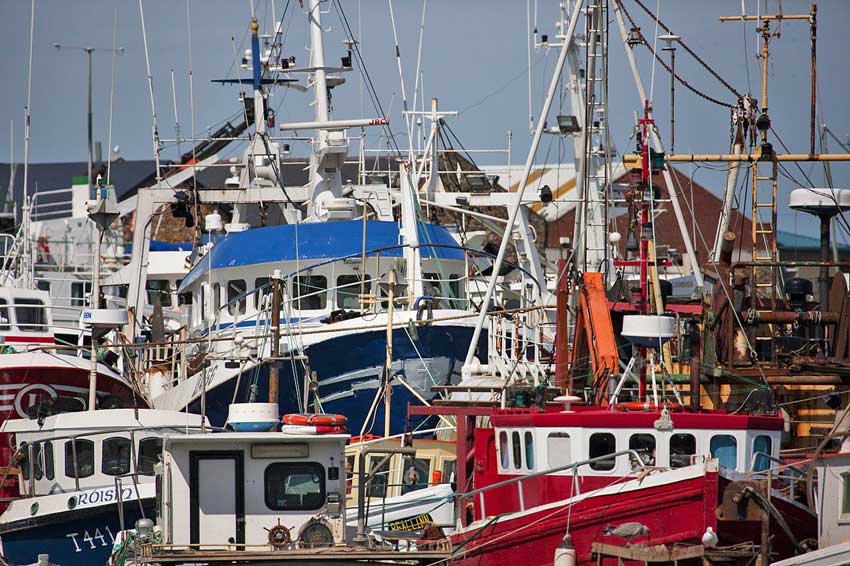 Fishing boats in Howth | Photo: William Murphy/Wikimedia
Fishing boats in Howth | Photo: William Murphy/Wikimedia
Inshore fishing take places in many rural communities with fishermen using small vessels to catch species such as lobsters, crabs, oysters, scallop, razor fish and clams. Inshore fish stocks (up to 10 miles from the Irish coast) are managed nationally and the Marine Institute works closely with Bord Iascaigh Mhara (BIM) on inshore fisheries management.
The seafood industry is also an integral part of Ireland’s rural coastal communities. In 2019, more than 16,000 people were employed directly and indirectly in the seafood industry, with high levels of employment in Ireland’s coastal regions in Donegal, Cork, Galway and Clare. Oysters, salmon and mussels are sustainably farmed around the coast of Ireland.
The aquaculture industry in Ireland produces about 37,000 tonnes annually, and the turnover generated by marine aquaculture in 2018 was estimated at €176 million. Shellfish aquaculture activities are widely distributed across the coast of Ireland, while finfish aquaculture occurs mainly in the west of Ireland.
Seaweed harvesting is a traditional activity in Ireland that also generates income and offers employment in coastal areas. Seaweed harvesting takes place around the coast of Ireland, particularly in counties Galway, Donegal, Sligo, Kerry and Cork.
Climate change impacts pose significant challenges to coastal communities. Such impacts include rising sea levels, coastal erosion, flooding, and an increase in extreme weather events.
Adapting to a changing climate is one of the greatest challenges facing society, governments and decision-makers worldwide. The Marine Institute works with national and international partners to observe and understand how our ocean is changing and to determine how to respond to current and future patterns of change that impact Ireland’s economy and people.
Through the BlueFish Project, a unique project linking art and science, the Marine Institute has also worked with coastal communities in Ireland and Wales on the importance of the ocean to their livelihoods and the impacts of a changing climate.
“As a small island nation, the health of our oceans and the wellbeing of our coastal communities have always been and will continue to be inextricably linked,” said Dr Connolly


























